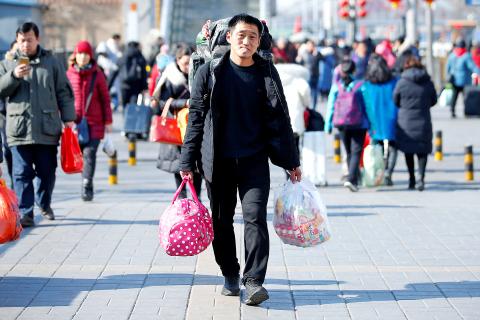The downward pressure on China’s consumption persisted over the Lunar New Year holiday, the annual festival when people travel, shop and give gifts or money.
People in China spent 1.01 trillion yuan (US$149 billion) at restaurants, shopping malls and online outlets over the week-long holiday, according to the Chinese Ministry of Commerce.
That was 8.5 percent higher than during last year’s festive period, but the slowest increase since at least 2011.

Photo: Reuters
Increasingly frugal Chinese consumers are sending chills through global investors, with the pullback in spending hitting the profits of companies such as Apple Inc, Swatch Group AG and luxury car makers.
Weaker growth, the trade war with the US and a crackdown on debt all undercut momentum last year, sending auto purchases into a contraction for the first time in almost three decades and retail sales growth to the slowest pace since 2002.
“We believe household consumption will likely be sluggish, “ Nomura Holding Inc chief China economist Lu Ting (陸挺) wrote, citing the quick buildup of household debt, lackluster income growth outlook amid the economic slowdown and the cooling property sector.
“We expect the government to rely more on infrastructure investment to stabilize economic growth, but it may take time for infrastructure investment projects to start,” Lu said.
Spending at tourist venues rose 8.2 percent to 513.9 billion yuan, state broadcaster CCTV said, citing data from the ministry, slower than the 12.6 percent rise last year.
Domestic box office revenue was 1 percent higher than last year, according to a report in The Paper, which cited statistics from a cinema ticketing service platform of Alibaba Pictures Group (阿里巴巴影業集團).
Those who are still shopping are increasingly doing it online, with JD.com (京東) reporting a 43 percent jump in sales around the holiday versus a year earlier.
Cellphones, computers and home appliances were at the top of shopping lists, and there was a surge in purchases of kitchenware and furniture, according to a report from the second largest e-commerce site in the nation.
Spending growth in smaller cities jumped 55 percent on Alibaba Group Holding’s (阿里巴巴) Tmall (天貓), faster than in major metropolises, where residents are being squeezed by higher housing prices.
Tourists chose Hong Kong, Thailand and Macau as their top overseas destinations, according to Alibaba’s online tourism site.
The US was the seventh most-popular spot, even amid the trade tensions.
Chinese mainland visitors to Macau reached almost 900,000 during the week-long holiday, climbing 26 percent from last year’s festive holiday, according to Macau’s tourism office.
That was more than double last year’s growth, but actual casino revenue data might not look as rosy as the visitation numbers.
“The Chinese New Year holiday season was decent this year, but definitely not as strong as the visitation number shows,” Union Gaming Securities Asia Ltd analyst Grant Govertsen said yesterday.
Based on spot checks on the ground, Govertsen said that many mainland visitors to Macau are day trippers who travel to check out the new bridge linking Zhuhai on the mainland to Macau and leave soon after without stopping at the territory’s casinos or spending money in the city.

To many, Tatu City on the outskirts of Nairobi looks like a success. The first city entirely built by a private company to be operational in east Africa, with about 25,000 people living and working there, it accounts for about two-thirds of all foreign investment in Kenya. Its low-tax status has attracted more than 100 businesses including Heineken, coffee brand Dormans, and the biggest call-center and cold-chain transport firms in the region. However, to some local politicians, Tatu City has looked more like a target for extortion. A parade of governors have demanded land worth millions of dollars in exchange

An Indonesian animated movie is smashing regional box office records and could be set for wider success as it prepares to open beyond the Southeast Asian archipelago’s silver screens. Jumbo — a film based on the adventures of main character, Don, a large orphaned Indonesian boy facing bullying at school — last month became the highest-grossing Southeast Asian animated film, raking in more than US$8 million. Released at the end of March to coincide with the Eid holidays after the Islamic fasting month of Ramadan, the movie has hit 8 million ticket sales, the third-highest in Indonesian cinema history, Film

Taiwan Semiconductor Manufacturing Co’s (TSMC, 台積電) revenue jumped 48 percent last month, underscoring how electronics firms scrambled to acquire essential components before global tariffs took effect. The main chipmaker for Apple Inc and Nvidia Corp reported monthly sales of NT$349.6 billion (US$11.6 billion). That compares with the average analysts’ estimate for a 38 percent rise in second-quarter revenue. US President Donald Trump’s trade war is prompting economists to retool GDP forecasts worldwide, casting doubt over the outlook for everything from iPhone demand to computing and datacenter construction. However, TSMC — a barometer for global tech spending given its central role in the

Alchip Technologies Ltd (世芯), an application-specific integrated circuit (ASIC) designer specializing in server chips, expects revenue to decline this year due to sagging demand for 5-nanometer artificial intelligence (AI) chips from a North America-based major customer, a company executive said yesterday. That would be the first contraction in revenue for Alchip as it has been enjoying strong revenue growth over the past few years, benefiting from cloud-service providers’ moves to reduce dependence on Nvidia Corp’s expensive AI chips by building their own AI accelerator by outsourcing chip design. The 5-nanometer chip was supposed to be a new growth engine as the lifecycle